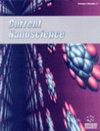Optimization of Reduction Time for Chemically Synthesized rGO
IF 1.5
4区 材料科学
Q4 BIOTECHNOLOGY & APPLIED MICROBIOLOGY
引用次数: 0
Abstract
Introduction: This article presents structural and morphological analysis for graphene oxide (GO) synthesized via Hummers' method and for reduced Graphene Oxide (rGO) prepared by chemical reduction. Graphene Oxide is synthesized from graphite powder at room temperature. Hydrazine hydrate is used as a reducing agent to reduce the accumulated GO. Method: To understand the impact of reduction time on structural parameters of produced rGO, three different time limits, i.e. 4, 5, and 6 hrs at 800 °C are used. FTIR spectra show the presence of all functional groups to confirm the authenticity of rGO samples. The XRD peaks are utilized to calculate different structural parameters for all the samples to identify the effect of reduction time. A change in the band gap energy may be noticed from UV-Vis absorption spectra. Result: It indicates that with the increase in reduction time, the absorption edge shifts to a lower wavelength value. FESEM micrographs reveal a flake-like random growth of rGO with prominent wrinkled structures, which is a signature of graphene-like 2D material. Conclusion: Hence, from the structural and absorption studies, it can be concluded that an increase in reduction time will produce smaller rGO flakes in the Hummers synthesis method.优化化学合成 rGO 的还原时间
导言:本文介绍了通过 Hummers 方法合成的氧化石墨烯(GO)和通过化学还原法制备的还原氧化石墨烯(rGO)的结构和形态分析。氧化石墨烯由石墨粉在室温下合成。使用水合肼作为还原剂来还原累积的 GO。方法:为了了解还原时间对生成的 rGO 结构参数的影响,在 800 °C 下使用了三个不同的时限,即 4、5 和 6 小时。傅立叶变换红外光谱显示了所有官能团的存在,从而确认了 rGO 样品的真实性。利用 XRD 峰计算所有样品的不同结构参数,以确定还原时间的影响。紫外可见吸收光谱显示带隙能发生了变化。结果:结果表明,随着还原时间的延长,吸收边缘会向低波长值移动。FESEM 显微照片显示 rGO 呈片状无序生长,并具有突出的皱褶结构,这正是类石墨烯二维材料的特征。结论:因此,从结构和吸收研究中可以得出结论,在 Hummers 合成法中,增加还原时间将产生更小的 rGO 片。
本文章由计算机程序翻译,如有差异,请以英文原文为准。
求助全文
约1分钟内获得全文
求助全文
来源期刊

Current Nanoscience
工程技术-材料科学:综合
CiteScore
3.50
自引率
6.70%
发文量
83
审稿时长
4.4 months
期刊介绍:
Current Nanoscience publishes (a) Authoritative/Mini Reviews, and (b) Original Research and Highlights written by experts covering the most recent advances in nanoscience and nanotechnology. All aspects of the field are represented including nano-structures, nano-bubbles, nano-droplets and nanofluids. Applications of nanoscience in physics, material science, chemistry, synthesis, environmental science, electronics, biomedical nanotechnology, biomedical engineering, biotechnology, medicine and pharmaceuticals are also covered. The journal is essential to all researches involved in nanoscience and its applied and fundamental areas of science, chemistry, physics, material science, engineering and medicine.
Current Nanoscience also welcomes submissions on the following topics of Nanoscience and Nanotechnology:
Nanoelectronics and photonics
Advanced Nanomaterials
Nanofabrication and measurement
Nanobiotechnology and nanomedicine
Nanotechnology for energy
Sensors and actuator
Computational nanoscience and technology.
 求助内容:
求助内容: 应助结果提醒方式:
应助结果提醒方式:


